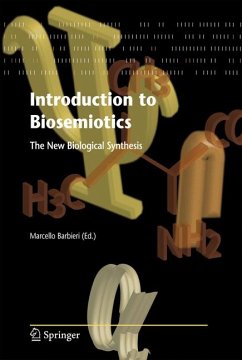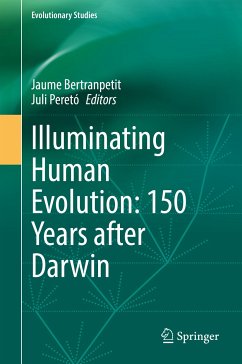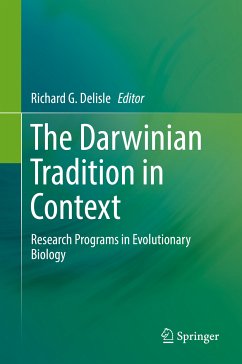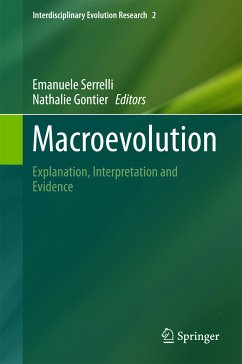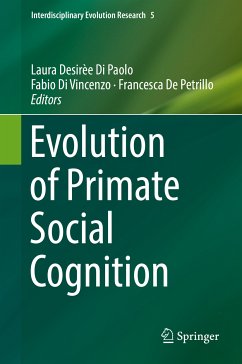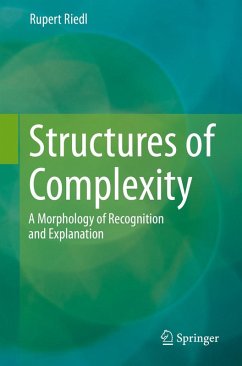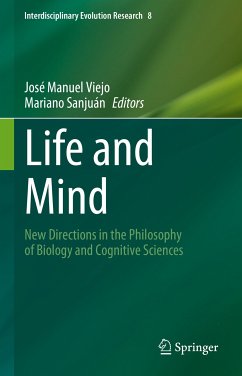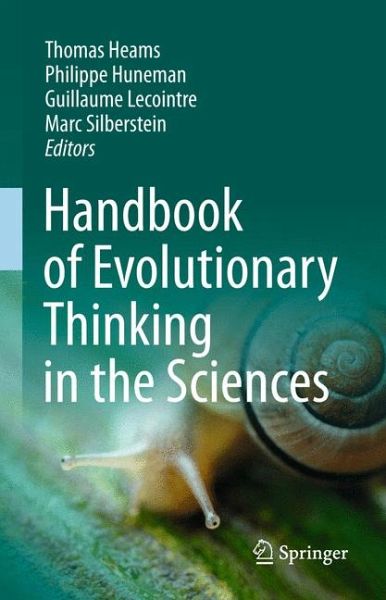
Handbook of Evolutionary Thinking in the Sciences (eBook, PDF)
Versandkostenfrei!
Sofort per Download lieferbar
160,95 €
inkl. MwSt.
Weitere Ausgaben:

PAYBACK Punkte
80 °P sammeln!
The Darwinian theory of evolution is itself evolving and this book presents the details of the core of modern Darwinism and its latest developmental directions. The authors present current scientific work addressing theoretical problems and challenges in four sections, beginning with the concepts of evolution theory, its processes of variation, heredity, selection, adaptation and function, and its patterns of character, species, descent and life.The second part of this book scrutinizes Darwinism in the philosophy of science and its usefulness in understanding ecosystems, whilst the third secti...
The Darwinian theory of evolution is itself evolving and this book presents the details of the core of modern Darwinism and its latest developmental directions. The authors present current scientific work addressing theoretical problems and challenges in four sections, beginning with the concepts of evolution theory, its processes of variation, heredity, selection, adaptation and function, and its patterns of character, species, descent and life.
The second part of this book scrutinizes Darwinism in the philosophy of science and its usefulness in understanding ecosystems, whilst the third section deals with its application in disciplines beyond the biological sciences, including evolutionary psychology and evolutionary economics, Darwinian morality and phylolinguistics. The final section addresses anti-Darwinism, the creationist view and issues around teaching evolution in secondary schools.
The reader learns how current experimental biology is opening important perspectives on the sources of variation, and thus of the very power of natural selection. This work examines numerous examples of the extension of the principle of natural selection and provides the opportunity to critically reflect on a rich theory, on the methodological rigour that presides in its extensions and exportations, and on the necessity to measure its advantages and also its limits.
Scholars interested in modern Darwinism and scientific research, its concepts, research programs and controversies will find this book an excellent read, and those considering how Darwinism might evolve, how it can apply to the human sciences and other disciplines beyond its origins will find it particularly valuable.
Originally produced in French (Les Mondes Darwiniens), the scope and usefulness of the book have led to the production of this English text, to reach a wider audience.
This book is a milestone in the impressive penetration by Francophone scholars into the world of Darwinian science, its historiography and philosophy over the last two decades.
Alex Rosenberg, R. Taylor Cole Professor of Philosophy, Duke University
Until now this useful and comprehensive handbook has only been available to francophones. Thanks to this invaluable new translation, this collection of insightful and original essays can reach the global audience it deserves.
Tim Lewens, University of Cambridge
The second part of this book scrutinizes Darwinism in the philosophy of science and its usefulness in understanding ecosystems, whilst the third section deals with its application in disciplines beyond the biological sciences, including evolutionary psychology and evolutionary economics, Darwinian morality and phylolinguistics. The final section addresses anti-Darwinism, the creationist view and issues around teaching evolution in secondary schools.
The reader learns how current experimental biology is opening important perspectives on the sources of variation, and thus of the very power of natural selection. This work examines numerous examples of the extension of the principle of natural selection and provides the opportunity to critically reflect on a rich theory, on the methodological rigour that presides in its extensions and exportations, and on the necessity to measure its advantages and also its limits.
Scholars interested in modern Darwinism and scientific research, its concepts, research programs and controversies will find this book an excellent read, and those considering how Darwinism might evolve, how it can apply to the human sciences and other disciplines beyond its origins will find it particularly valuable.
Originally produced in French (Les Mondes Darwiniens), the scope and usefulness of the book have led to the production of this English text, to reach a wider audience.
This book is a milestone in the impressive penetration by Francophone scholars into the world of Darwinian science, its historiography and philosophy over the last two decades.
Alex Rosenberg, R. Taylor Cole Professor of Philosophy, Duke University
Until now this useful and comprehensive handbook has only been available to francophones. Thanks to this invaluable new translation, this collection of insightful and original essays can reach the global audience it deserves.
Tim Lewens, University of Cambridge
Dieser Download kann aus rechtlichen Gründen nur mit Rechnungsadresse in A, B, BG, CY, CZ, D, DK, EW, E, FIN, F, GR, HR, H, IRL, I, LT, L, LR, M, NL, PL, P, R, S, SLO, SK ausgeliefert werden.




